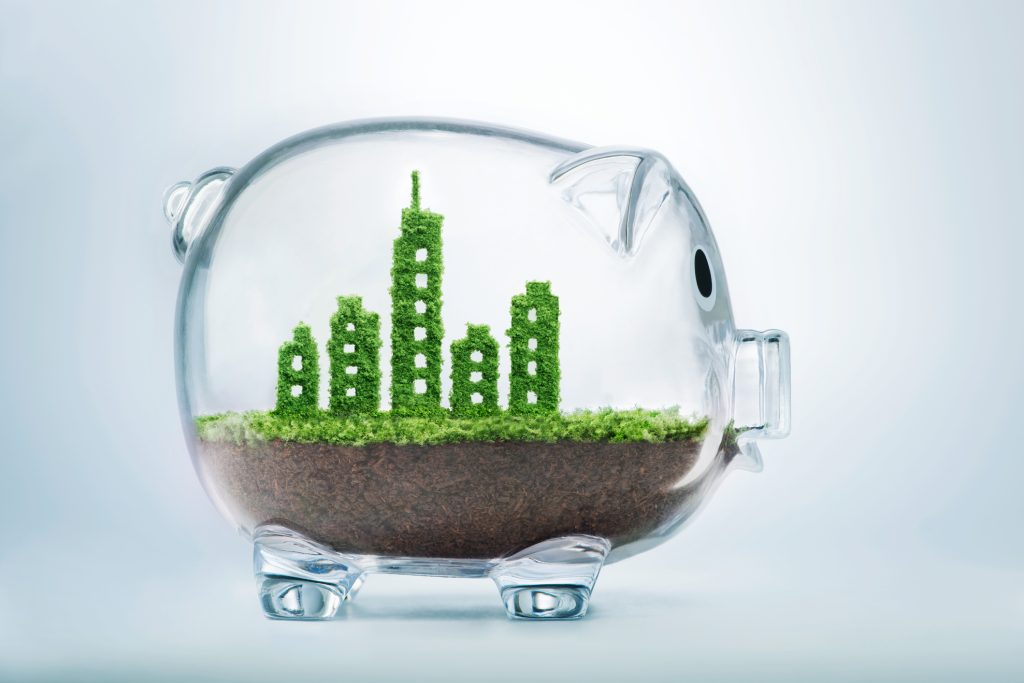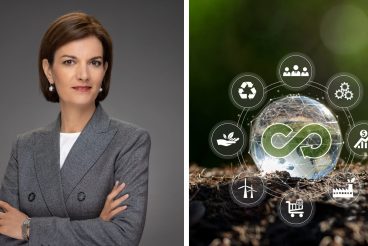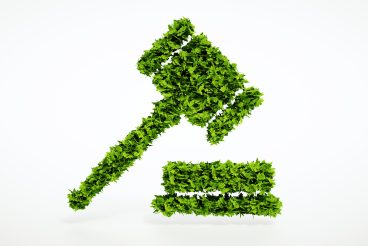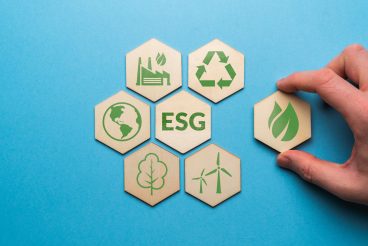
How is the global green transition impacting banks’ operations? As green, impact and sustainable finance rise as a priority among banks and their clients, we asked Riana Poupin and Arnaud Waxweiler, experts at ING Luxembourg, to help us understand how client demands are changing — and how new EU sustainability rules and regulations are affecting banks’ services.
What kind of projects are clients bringing to banks in an effort to become more sustainable or to finance sustainable projects?

Increasingly, we have seen that our professional clients’ investments are intended to be cleaner and more environmentally friendly – which is fantastic.
Such ESG-oriented shifts in approach are obvious for certain equipment such as with photovoltaic panels, cars or buses, particularly within the framework of the RGTR (Régime Général des Transports Routiers) project that started in 2022 in Luxembourg.
However, many companies are also attentive to the different labels of the other assets in which they invest. We can say that the commitment to sustainability is no longer the prerogative of a few avant-garde companies – rather, it is now all economic players who are careful to invest for the well-being of all.
Industries, manufacturers and suppliers are all adapting their business models, R&D and production to fit within the energy transition.
Industrial plants, for example, aim to reduce and control pollution with wastewater treatment, greenhouse gas controls, recycling and waste-to-energy. They are also developing eco-efficient or circular economy products, production technologies and processes, as well as eco-labelled or certified products, resource efficient packaging and distribution.
Specific sectors are willing to decarbonize mobility and sustainable transportation while using renewable energies such as electric, hybrid, rail, non-motorized and multi-modal transportation.
From our perspective, we can see a dedicated focus from our clients to develop and invest in projects that are especially good for the environment.
How can banks position themselves to support sustainable project proposals?

This is an important question that all banks should be considering.
Sustainable development is not the sole responsibility of companies whose vocation is to produce and transport the equipment they produce. By financing their investments, banks also play a key role in the success of such projects – we are the institutions that enable the various economic players to succeed in their sustainable transitions.
While we can’t speak to how all banks can and should serve this role, we can give some context in relation to our own activities. So here are five ways banks can position themselves to better support the sustainability transition:
- Commitments: Simply put, it’s about ‘walking the walk.’ One way ING has committed to placing sustainability at the heart of our strategy was by joining the Net Zero Banking Alliance two years ago. A key goal for us is to steer our operations however necessary to stay in line with keeping the rise in global temperatures to 1.5 degrees Celsius.
- Financing: Another way banks like us can help achieve such goals and create positive impact on climate action is through financing. For ING, a concrete action is that since 2018, we are steering the most carbon-intensive parts of our portfolio towards reaching net zero by 2050. We call this the “Terra approach”.
- Partnerships: Banks can also support sustainable projects through partnerships with charities and organisations entirely dedicated to doing good. For instance, we developed a partnership with Reforest’Action, a French B-Corp-certified company that restores and creates forests around the world. For any activated lending or leasing contracts, ING Luxembourg is committed to plant one tree in the Great Region (France and Belgium).
- Incentivisation: It is also important for banks to incentivise clients towards ‘greener’ projects. ING Lease Luxembourg together with the Business Banking department, via ING Group, negotiated special conditions with the European Investment Bank, one of the main promoters of cleaner energy, to provide a discount for sustainable investments initiated by our clients.
- Measurement: This is a crucial, but often forgotten, element of any sustainable project. It simply is not enough to offer sustainable investments facilities; it is equally imperative to be able to measure environmental impacts in order to allow customers to assess the impact of their investments.
Are special lending or other products particularly suitable for such projects?
To achieve the goal of a carbon-free planet, banks, too, have had to adapt and be creative. It goes beyond adjusting their prices to this new reality – they must also transform their service offer.
As a result, as the main financing vehicles lending and leasing have become much more flexible than in the past — enough to help companies change their behaviour and encourage them to contribute fully to a cleaner world.
Companies are not alone in benefiting from banks’ sustainable offers. Individuals can also adopt a responsible approach with support from their bank.
For instance, banks can offer reduced rates or zero rates for loans on sustainable renovation or installation projects on homes. These types of loans, which should always have a favourable rate, can come in the form of a personal loan or as a mortgage.
Leasing can be an especially powerful tool as it is an asset-based product, meaning you can easily assess the underlying asset. It particularly suits sustainable projects related to the energy transition, as mentioned above.
How do EU sustainability rules affect the type of projects proposed and banks’ ability to respond to them?
The EU has implemented various sustainability rules and regulations that impact this dynamic between banks and their clients. The most predominant one is the EU Green Taxonomy, which currently focuses on the climate mitigation and adaptation objectives.
To meet these new rules and regulations, banks must create new operational criteria.
Beyond the regulated sustainability rules, ING Luxembourg has implemented screening criteria for other environmental objectives such as circular economy or water resources, as well as social criteria, for example for the healthcare sector.
We are also putting our financing at work through Sustainable Improvement Loans or Green Loans to support the transition of our clients. These changes help use monitor them using specific ESG KPI like the ESG rating.
There is no doubt that the EU’s sustainability rules are likely to continue impacting this space, especially as investors increasingly prioritise sustainability considerations in their investment decisions.
For example, the EU launched its Sustainable Finance Action Plan to promote sustainable investment and to ensure that the financial sector contributes to achieving the EU’s climate goals. To comply with those regulations, banks must align their lending and investment activities with the EU’s climate goals.
Finally, we come to reporting. The EU has understandably placed a growing importance on banks to report on their sustainability practices and disclose information on the environmental and social impact of their lending and investment activities.
How will the EU’s Corporate Sustainability Reporting Directive (CSRD) and the Corporate Sustainability Due Diligence Directive affect the way banks approach this market?
Those directives will have a significant impact on the way banks approach the sustainability market.
For starters, companies will have to provide and publish a significant amount of new information on their sustainability practices, including their social and environmental impact.
This means banks will have to align their own annual reports with the CSRD and European Sustainability Reporting Standards (ESRS) requirements – not only for their own ESG footprint, but also throughout their value chain, which will allow investors to benchmark the banking sector based on ESG criteria.
The most important impact, though, is the tremendous opportunity these directives present banks, as they will empower us to collect and use this new information to better reflect and respond to the ESG preferences of our clients in the investment value chain.
Banks will also need to take this new data into account when evaluating the risks associated with a potential financing opportunity. Ultimately, the increased reporting and due diligence requirements will lead to a shift in lending and investment strategies for banks as they will need to prioritize companies that have a strong commitment to sustainability and are taking steps to improve their environmental and social impact.
ING, like many other banks, implemented an environmental and social risk framework a long time ago. The Corporate Sustainability Due Diligence Directive therefore offers a good opportunity to align those methodologies that will require collaboration between companies, regulators and financial institutions to promote sustainable practices.
These are they kinds of changes that will encourage banks to work closely with companies to ensure that they are meeting sustainability standards and addressing their social and environmental risks.
— — —
Riana Poupin is currently Managing Director of ING Lease, a subsidiary of ING Luxembourg. She has more than 20 years’ experience in the financial industry and has a strong track record in commercial functions in Wholesale and Private Banking within international banks in Paris and Luxembourg.
Arnaud Waxweiler is currently Sustainability Lead at ING in Luxembourg. He started his professional career almost 13 years ago having different roles such as business analyst, project manager, team manager IT Finance and Risk, with teams located either locally or in international environments.





